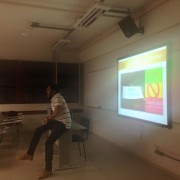Language, thought, and time perception: How far-fetched is the movie Arrival?
Written by André Hedlund and Rodolfo Mattiello
The idea that multilingualism develops cognitive potential and influences perception is well explored in the specialized literature. Linguists and cognitive scientists have long proposed the notion that language determines thoughts or at least shapes them depending on how adept they are to the Sapir-Whorf Hypothesis (Boroditsky, 2001). Several authors have also been able to find a high correlation between bilingual brains and executive functions (updating, switching, and inhibiting) as well as cognitive reserve, which buys the brain a few years before it develops dementia, thus, extending its protective effects (Perani & Abutalebi, 2015; Bialystok et al. 2004). It seems that learning languages have significant effects on cognition, however, what would happen if humans could access, be exposed to, and even learn an alien language? This premise is explored in one of Denis Villeneuve’s latest productions: the film Arrival (2016, Paramount).
Watching this amazing film can be interesting not only to language teachers but to all who actually like Neurocognitive Linguistics. Apart from the sci-fi aspect of the movie when they talk about time traveling based on how the alien language is perceived, first we can focus on the issue of how our perception is changed based on the new linguistic experiences. According to Fodor (2008), “experience affects concept learning only as it is mentally represented” (Fodor, 2008: 135) and in the case of the alien language in the film, in which chronological time is not essential for understanding, the main character (Amy Adams as a linguist) has a whole different perception of time.
It could be argued then that what Arrival promotes is based on our current understanding of how languages influence cognition and based on the Sapir-Whorf Hypothesis. It is important to highlight, though, that this hypothesis is still a matter of debate and we could claim that the movie goes one step, or perhaps several, too far in suggesting humans would be able to rewire the linear perspective of time hammered into the brain since birth (and even from the womb) by being exposed to an alien language for a relatively short period of time. When one learns a second language (L2), its initial stage is never the same as the initial stage of the learning process of a native language (L1) for concepts have already been learned and time, as an epistemic conceptualization, is part of it. In the film, when aliens use their language, time is not essential for communication. For instance, if they want to communicate ‘yesterday we saw that’ they would simply produce the words ‘we’, ‘that’, ‘see’, ‘yesterday’ without any time modality because for them, time is perceived differently and it does not have an essential apparent role in their oral language.
When Amy Adams learns this new language, her epistemic notion of time shifts for the concept of time that she possesses gets updated, remolded by the alien language. If we analyze the retrieval of concepts backwards, from words and grammar to concepts, the understanding of a new language will reshape epistemic parameters in order to grant effective communication (Dabrowska, 2004). When people engage in a conversation, some linguistic features such as phonemes, lexis, concepts, etc., must be shared otherwise it will not have an effective outcome (there will be misunderstandings). These concepts we share are developed as we interact and create schemas (Croft, 2007, Dabrowska, 2004, Fodor, 2008, Langacker, 2007) and they can always change depending on the language that will be used and the interlocutor.
The first argument we might throw at Villeneuve’s production and scriptwriters against the depiction of this alien encounter is that it’s quite unlikely for our species to fathom and be guided by a concept of time that is not based on our tridimensional existence. Time is perceived by us through our senses and internal biological clock which are intrinsically connected to our lifespans. It has a physiological aspect that could not possibly be affected by learning an incredibly different language. The second argument might be related to our technological limitations. The civilization of Abbot and Costello, the aliens portrayed in the movie, might have figured out how to warp the space-time fabric and that means that time to them works differently.
To better illustrate this idea, let’s think of how new technologies have changed our perception of time. Before the telegram, letters would take several days to arrive at their destination. With telephones, humans were able to call many people from distant places and shorten the time to get an answer about any issue from a couple of weeks to a couple of hours. Nowadays we can virtually connect with most of the world and send messages that take less than a second to get to the receiver. These technological advances have shaped our perspective of time and how long things take to be done, nevertheless, time has remained a linear constant for humans because events still happen in a sequential manner, even if the next step of the sequence takes less than a second to occur.
Therefore, our epistemic concepts are susceptible to change as we are exposed to, learn and use new languages, no doubt. The schemas we develop become updated so that we can engage in an effective conversation with shared features. Nonetheless, it might be inconceivable for humans to be able to rewire the consolidated neuronal networks in our brains, which are the product of years of genetic, psychological, and social interactions, in such a way that would allow us to perceive time so differently.
Think for a second about cultures that might not value the future as we do. They live one day after the other, bound to the scarcity or abundance of their contexts. This is the case of the Pirahã tribe in the Amazon. According to linguist Dan Everett (2017), the Pirahã have developed a simple language based on just a few sounds, which gave them all the necessary resources to communicate effectively about their way of life. They do not have numerals, a distinction about the future and the past, or mythology. They are stuck in the present so to speak. They are limited by the boundaries of their empirical existence. They focus on what they can see and hear right in front of them or through someone else’s senses. Here is the thing: even though they do not place a lot of focus on the distant future and do not really plan it, they still experience time as a succession of events but that’s part of human biology. They can even refer to the future are something that would translate into “far time”
Now think of the time perception of a child. Children are hedonistic little people, very much like the Pirahã, trapped in the present. But that has to do with their underdeveloped prefrontal cortex. Although a four or five-year-old can understand the notion of a future, they cannot really conceptualize such an abstract idea that is too distant from their lived reality. Imagine then an ape and how we could possibly teach them the notion of, let’s say, millions of years ago or say that in many billion years our sun is bound to consume its energy and explode. Their existence and lack of language wouldn’t allow them to understand let alone rewire their brains to start experiencing time in a different way because even if we tried as hard as we could, they would simply lack the cognition to comprehend such abstractions.
That might be the case for Amy Adams. In the film, she’s the ape and the aliens are the humans. If we consider language a vessel to convey our thoughts and perceptions, we will have to stick to the idea that no language, human or alien, will ever be able to fundamentally change how we experience the physical world when it comes to the limits of our existence. For now, the concept that a language can “unlock” hidden cognitive potential that could substantially transform the fabric of space-time and all the matter within right before our eyes will have to stay in the sci-fi section of our favorite streaming provider and books.









Deixe uma resposta
Want to join the discussion?Feel free to contribute!